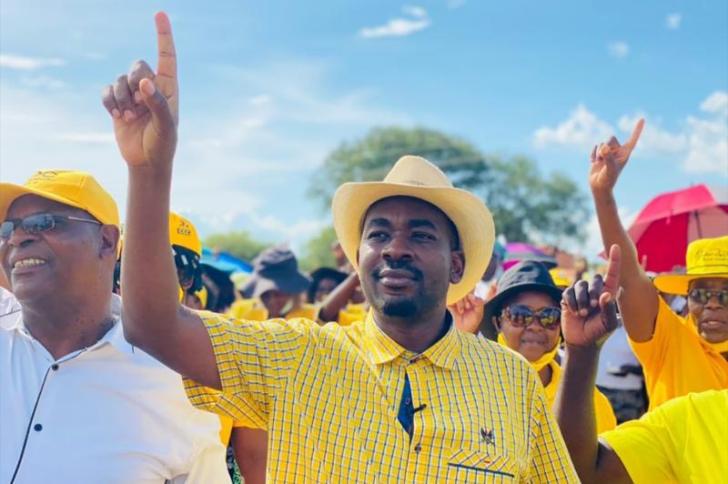News / National
Mnangagwa 8 points ahead of Chamisa in presidential race - survey
10 Jul 2023 at 18:34hrs |
1 Views

President Emmerson Mnangagwa enjoys an eight percentage points lead on opposition rival Nelson Chamisa going into general elections on August 23, but none of the men has a sufficient vote to win the election outright, according to a new poll released on Monday.
The Afrobarometer poll shows Mnangagwa ahead with 35 percent and Chamisa trailing on 27 points. In a previous Afrobarometer poll released in June 2022, Mnangagwa was on 30 percent and Chamisa on 33 percent. To win a presidential election outright, a candidate needs 50 percent plus one vote.
In a hypothetical parliamentary election, the survey puts Zanu-PF at 35 percent to the CCC's 26 percent.
Afrobarometer said 27 percent of the 2,400 people surveyed refused to reveal their voting intentions in the presidential race, and 26 percent of the respondents also would not indicate how they would vote in a parliamentary election.
Afrobarometer said the survey, conducted by the Mass Public Opinion Institute in Zimbabwe, has a +/-2 percent margin of error at 95 percent confidence level.
Political analyst Phillan Zamchiya said: "In a turn of voting trends, the survey shows a decline in support for the opposition and a surge in support for the ruling Zanu-PF. However, a significant number of respondents, 26 percent (parliamentary) and 27 percent (presidential), refused to reveal their preferences for the parliamentary and presidential elections respectively. This is not surprising in a repressive environment. Opposition supporters are more likely to fear expressing their political affiliation compared to ruling party members in authoritarian contexts.
"Nevertheless, it is not a given that all those who refused to say their preference would vote for the CCC unless they tell us so. The good news for CCC though is that this base of potential voters is huge enough to swing the vote in their favour and win both at parliamentary and presidential level, that is if they do the right things and the environment becomes relatively free and fair."
Zanu-PF's poll lead is all the more surprising as the same survey showed 65 percent of respondents, representing nearly two thirds of the population, thought the country is going in the wrong direction and a large majority of 69 percent said the country's economic situation is fairly bad or very bad.
Eight in 10 respondents said they were registered voters and 63 percent of them said they are interested in elections and will most likely vote on August 23.
At least 59 percent expressed fear of becoming victims of political violence.
Unemployment (46 percent), management of the economy (35 percent) and infrastructure development (26 percent) were top of the list of citizens' concerns going into the election.
In 2018, the Zimbabwe Electoral Commission announced that Mnangagwa had won a clear majority in the first round of the vote with 51.44 percent to Chamisa's 45.07, but the opposition accused the elections body of cooking up figures. The Constitutional Court tossed a results challenge by Chamisa.
Afrobarometer describes itself as a pan-African, non-partisan research project which measures attitudes on democracy and governance in 39 African countries. It was formed in 1999.
The Afrobarometer poll shows Mnangagwa ahead with 35 percent and Chamisa trailing on 27 points. In a previous Afrobarometer poll released in June 2022, Mnangagwa was on 30 percent and Chamisa on 33 percent. To win a presidential election outright, a candidate needs 50 percent plus one vote.
In a hypothetical parliamentary election, the survey puts Zanu-PF at 35 percent to the CCC's 26 percent.
Afrobarometer said 27 percent of the 2,400 people surveyed refused to reveal their voting intentions in the presidential race, and 26 percent of the respondents also would not indicate how they would vote in a parliamentary election.
Afrobarometer said the survey, conducted by the Mass Public Opinion Institute in Zimbabwe, has a +/-2 percent margin of error at 95 percent confidence level.
Political analyst Phillan Zamchiya said: "In a turn of voting trends, the survey shows a decline in support for the opposition and a surge in support for the ruling Zanu-PF. However, a significant number of respondents, 26 percent (parliamentary) and 27 percent (presidential), refused to reveal their preferences for the parliamentary and presidential elections respectively. This is not surprising in a repressive environment. Opposition supporters are more likely to fear expressing their political affiliation compared to ruling party members in authoritarian contexts.
Zanu-PF's poll lead is all the more surprising as the same survey showed 65 percent of respondents, representing nearly two thirds of the population, thought the country is going in the wrong direction and a large majority of 69 percent said the country's economic situation is fairly bad or very bad.
Eight in 10 respondents said they were registered voters and 63 percent of them said they are interested in elections and will most likely vote on August 23.
At least 59 percent expressed fear of becoming victims of political violence.
Unemployment (46 percent), management of the economy (35 percent) and infrastructure development (26 percent) were top of the list of citizens' concerns going into the election.
In 2018, the Zimbabwe Electoral Commission announced that Mnangagwa had won a clear majority in the first round of the vote with 51.44 percent to Chamisa's 45.07, but the opposition accused the elections body of cooking up figures. The Constitutional Court tossed a results challenge by Chamisa.
Afrobarometer describes itself as a pan-African, non-partisan research project which measures attitudes on democracy and governance in 39 African countries. It was formed in 1999.
Source - zimlive
Join the discussion
Loading comments…


























